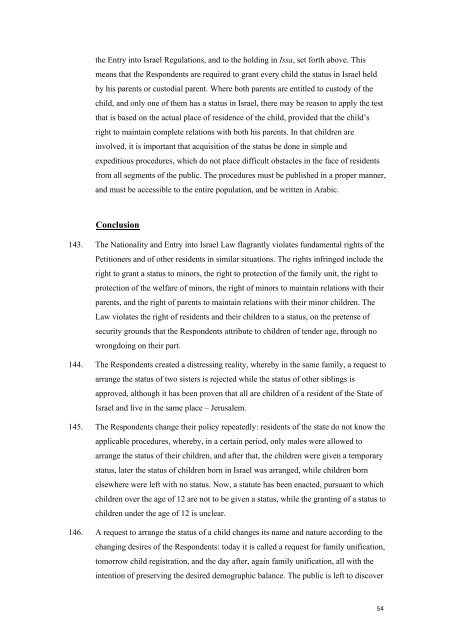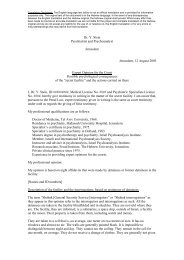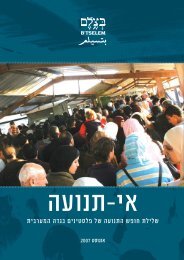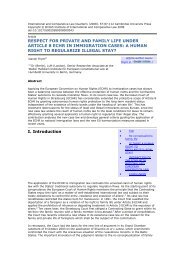HCJ 10650/03 Abu Gwella et. al v
HCJ 10650/03 Abu Gwella et. al v
HCJ 10650/03 Abu Gwella et. al v
You also want an ePaper? Increase the reach of your titles
YUMPU automatically turns print PDFs into web optimized ePapers that Google loves.
the Entry into Israel Regulations, and to the holding in Issa, s<strong>et</strong> forth above. This<br />
means that the Respondents are required to grant every child the status in Israel held<br />
by his parents or custodi<strong>al</strong> parent. Where both parents are entitled to custody of the<br />
child, and only one of them has a status in Israel, there may be reason to apply the test<br />
that is based on the actu<strong>al</strong> place of residence of the child, provided that the child’s<br />
right to maintain compl<strong>et</strong>e relations with both his parents. In that children are<br />
involved, it is important that acquisition of the status be done in simple and<br />
expeditious procedures, which do not place difficult obstacles in the face of residents<br />
from <strong>al</strong>l segments of the public. The procedures must be published in a proper manner,<br />
and must be accessible to the entire population, and be written in Arabic.<br />
Conclusion<br />
143. The Nation<strong>al</strong>ity and Entry into Israel Law flagrantly violates fundament<strong>al</strong> rights of the<br />
P<strong>et</strong>itioners and of other residents in similar situations. The rights infringed include the<br />
right to grant a status to minors, the right to protection of the family unit, the right to<br />
protection of the welfare of minors, the right of minors to maintain relations with their<br />
parents, and the right of parents to maintain relations with their minor children. The<br />
Law violates the right of residents and their children to a status, on the pr<strong>et</strong>ense of<br />
security grounds that the Respondents attribute to children of tender age, through no<br />
wrongdoing on their part.<br />
144. The Respondents created a distressing re<strong>al</strong>ity, whereby in the same family, a request to<br />
arrange the status of two sisters is rejected while the status of other siblings is<br />
approved, <strong>al</strong>though it has been proven that <strong>al</strong>l are children of a resident of the State of<br />
Israel and live in the same place – Jerus<strong>al</strong>em.<br />
145. The Respondents change their policy repeatedly: residents of the state do not know the<br />
applicable procedures, whereby, in a certain period, only m<strong>al</strong>es were <strong>al</strong>lowed to<br />
arrange the status of their children, and after that, the children were given a temporary<br />
status, later the status of children born in Israel was arranged, while children born<br />
elsewhere were left with no status. Now, a statute has been enacted, pursuant to which<br />
children over the age of 12 are not to be given a status, while the granting of a status to<br />
children under the age of 12 is unclear.<br />
146. A request to arrange the status of a child changes its name and nature according to the<br />
changing desires of the Respondents: today it is c<strong>al</strong>led a request for family unification,<br />
tomorrow child registration, and the day after, again family unification, <strong>al</strong>l with the<br />
intention of preserving the desired demographic b<strong>al</strong>ance. The public is left to discover<br />
54









